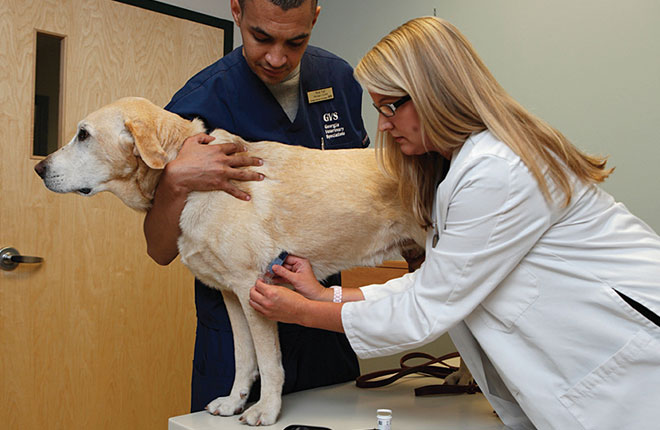Recognizing Your Family Pets' Nutritional Demands for Optimal Wellbeing

Value of Well Balanced Diets
Making sure a balanced diet plan for pets is important for their overall health and wellness and health. Family pets, like human beings, require a mix of proteins, carbohydrates, fats, minerals, and vitamins to keep optimal health and wellness.
Including a variety of nutrients makes certain that family pets preserve a durable body immune system, healthy skin, and a shiny coat. A balanced diet plan can stop a host of wellness concerns such as obesity, which is linked to diabetes mellitus and joint troubles, or poor nutrition, which can lead to developing delays and body organ dysfunction.
Pet dog proprietors have to bear in mind section sizes and caloric intake, as overfeeding or underfeeding can have serious consequences. Consulting with vets or animal nutritionists can help customize diet regimens to satisfy particular needs, making certain that family pets get the proper balance of nutrients necessary for their age, activity, and dimension degree. A consistent and balanced diet is crucial for an animal's long life and joy.
Species-Specific Nutritional Requirements
Just how do different types of family pets have differing dietary needs? Each types has one-of-a-kind metabolic paths, digestion systems, and dietary needs that must be met for ideal wellness.
Birds, relying on their varieties, may require a diet plan rich in seeds, pests, or fruits, emphasizing the diversity within the avian world. Pets. Reptiles, such as snakes and turtles, similarly demand species-specific diet plans, with some needing high levels of calcium and others, a well-calibrated balance of insects and plant matter
Comprehending the dietary distinctions amongst various varieties is crucial for family pet owners. By providing and acknowledging to these differences, we make certain the provision of proper nourishment, sustaining the overall health and wellbeing and vigor of our pet dogs.
Age and Size Factors To Consider
While species-specific dietary requirements lay the structure for a family pet's dimension, diet regimen and age more improve these demands. Young pets, such as pups and kitties, require diet plans rich in calories, proteins, and necessary nutrients to support fast development and advancement. These young creatures have higher metabolic prices and call for even more regular feedings to maintain their energy degrees and make certain appropriate advancement of bones, muscle mass, and organs.
Solutions developed for adult family pets usually concentrate on keeping weight, promoting digestive wellness, and supporting an energetic lifestyle. Alternatively, senior pets might profit from specialized diet regimens that address age-related challenges, such as joint health and wellness, cognitive function, and body organ assistance.

Health Conditions and Dietary Adjustments
Specific wellness problems can significantly influence the dietary demands of family pets, demanding tailored dietary adjustments to support their well-being. For example, pets with diabetes might take advantage of diets that are high in fiber and low in simple carbs to aid manage blood sugar level degrees. Likewise, obese animals often need reduced-calorie diet plans to advertise weight management and protect against affiliated wellness complications.
Pets with renal illness may require diets low in phosphorus and healthy protein to reduce kidney work. Omega-3 fatty acids, recognized for their anti-inflammatory buildings, can be helpful for family pets experiencing conditions like arthritis or inflammatory bowel condition. Additionally, pets with food allergic reactions or intolerances might require hypoallergenic diet regimens, commonly requiring a process of elimination to identify and exclude annoying components.
Vet guidance is essential when making nutritional changes, as incorrect nourishment can aggravate existing health issue or bring about new ones. Routine surveillance and modifications based upon the animal's feedback to nutritional adjustments are important. A well balanced strategy, taking into consideration both medical and nutritional needs, makes sure that nutritional treatments add positively to taking care of wellness problems, improving not only the animal's wellness but also their high quality of life.
Tips for Deciding On High Quality Pet Dog Food
Selecting the ideal family pet food is vital for ensuring your pet's wellness and durability. A balanced diet sustains their body immune system, keeps healthy weight and promotes general vitality. Begin by consulting your veterinarian to understand your animal's specific nutritional needs based upon health, age, and type standing.
When evaluating animal food, inspect the component checklist. Premium pet Learn More Here dog foods frequently provide real meat, fowl, or fish as the main component.
This indicates the food fulfills established nutritional criteria. Brand names with a history of recalls or poor high quality control ought to be approached with care.
Consider whether article your animal would take advantage of unique solutions such as grain-free, high-protein, or limited-ingredient diet regimens. These can be advantageous for animals with allergic reactions or certain health concerns. Last but not least, observe your family pet's reaction to the food. Monitor their layer problem, power levels, and digestion to make certain the diet plan works.
Verdict
A detailed understanding of family pets' dietary needs is important for advertising their optimum well-being. By adhering to these concepts, animal proprietors can considerably add to their family pets' development, power levels, and total health, promoting a better and healthier life.

Selecting the best pet dog food is critical for guaranteeing your pet's health and wellness and long life. By adhering to these principles, pet read this dog proprietors can dramatically contribute to their pet dogs' development, energy levels, and total health, fostering a better and healthier life.